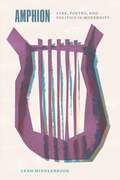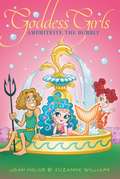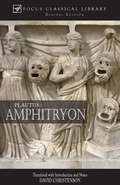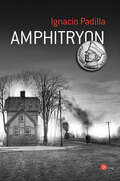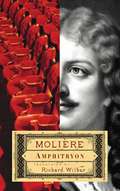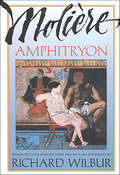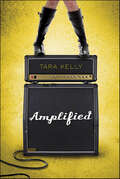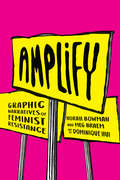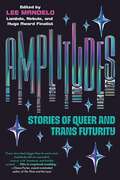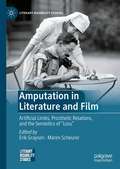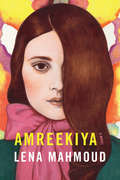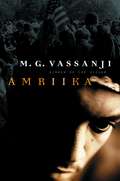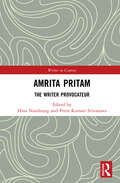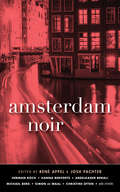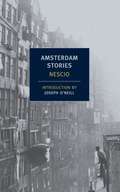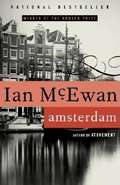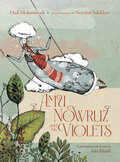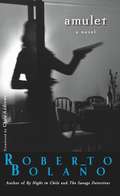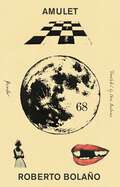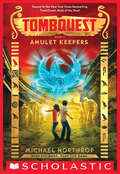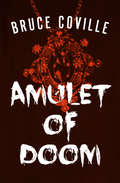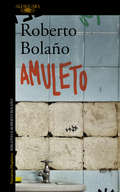- Table View
- List View
Amphion: Lyre, Poetry, and Politics in Modernity (Thinking Literature)
by Leah MiddlebrookA reintroduction to the myth of Amphion, recovering an overlooked sphere of lyric tradition. Amphion is the figure in Greek mythology who played so skillfully on a lyre that stones moved of their own accord to build walls for Thebes. While Amphion still presides over music and architecture, he was once fundamental to the concept of lyric poetry. Amphion figured the human power to inspire action, creating and undoing polities by means of language. In contrast to the individual inspiration we associate with the better-known Orpheus, Amphion represents the relentless, often violent, play of harmony and disorder in human social life. In this wide-ranging study, Leah Middlebrook introduces readers to Amphion-inspired poetics and lyrics and traces the tradition of the Amphionic from the Renaissance through modernist and postmodern poetry and translation from the Hispanic, Anglophone, French, Italian, and ancient Roman worlds. Amphion makes a significant contribution to scholarship on the connection between poetry and politics and the history of the lyric, offering an account well-suited to our times.
Amphitrite the Bubbly
by Joan Holub Suzanne WilliamsA new mergirl shows up at Mount Olympus Academy--and Poseidon just might be her perfect match in this seventeenth Goddess Girls adventure.Amphitrite is a mergirl with a big crush on Poseidon--but will his quirks make her fall out of like?
Amphitryon
by David Christenson PlautusThe play Amphitryon provides an introduction to the world of Roman comedy from one of its best practitioners, Plautus. As with all Focus translations, the emphasis is on an inexpensive, readable edition that is close to the original, with an extensive introduction, notes and appendices.
Amphitryon
by Ignacio PadillaCuando Amphitryon ganó el IV Premio Primavera, se reveló el espectacular dominio narrativo de Ignacio Padilla, así como su innata habilidad para pergeñar historias fascinantes envueltas en una trama que atrapa desde la primera línea. Un juego de doble identidad entre los líderes del Tercer Reich. Con una prosa sólida que le valió ser reconocido como uno de los escritores latinoamericanos más importantes en la actualidad, Ignacio Padilla fue galardonado con el Premio Primavera de Novela. Esta impactante novela, cuya trama se desarrolla entre la Primera y la Segunda Guerra Mundial, es una reflexión sobre la impostura y el intercambio de identidades. En sus páginas, el destino de sus personajes se desarrolla en un escenario convulso, en el que imperan las mentiras políticas, el exterminio de miles de personas y los juegos de poder. A bordo de un tren que parte rumbo al frente de batalla, Viktor Kretzschamar y Thadeus Dreyer disputan una partida de ajedrez. Si Thadeus gana, Viktor irá a la guerra en su lugar; si pierde, deberá matarse. Éste es el punto de partida de una serie de falseamientos de personalidad, que culmina con el "Proyecto Amphytrion", concebido por las autoridades nazis para crear una legión de dobles y proteger a los altos funcionarios militares y políticos del Tercer Reich.
Amphitryon
by Molière Richard Wilbur"Richard Wilbur's translations of classic French drama are among the undiscovered treasure of our recent literature."-The Hudson ReviewMolière's late, elegant comedy, based on Plautus' Roman version, alludes to the love affairs of the French king. This is the fourth and final volume of Theatre Communication Group's series (with cover designs by Chip Kidd), completing trade publication of these vital theatrical works. ncludes Richard Wilbur's translation notes.Richard Wilbur is a two-time winner of the Pulitzer Prize, and a former poet laureate of the United States. His verse translations of Molière's plays have been performed for audiences throughout the world.
Amphitryon
by MolièreAfter his wedding night with beautiful Alcmene, Amphitryon leaves to participate in a war. Jupiter, who is fascinated by Alcmene's beauty, come to earth under the appearance of Amphitryon, accompanied by Mercury who has taken the appearance of Amphitryon's servant Sosie. Amphitryon is successful in war and sends Sosie back home to report this. <P> <P> Sosie is greeted by his look-alike Mercury, who beats him and convinces him that he Mercury is the real Sosie. The real Amphitryon meets Alcmene and is naturally confused and shocked by her account of an amorous night. Various other confusing episodes of the same type take place, including a confrontation between the two Amphitryon's. In the end, Jupiter assumes his real aspect and tells Amphitryon that his wife was faithful, since he had to take on Amphitryon's aspect in order to seduce her. He informs Amphitryon that his wife will bear Jupiter's child, the demi-god Hercules.
Amphitryon, By Molière: The Misanthrope / Amphitryon / Tartuffe / The Learned Ladies
by MolièreWilbur is at the peak of his form in this stellar translation of an unusual Molière play-populated with Greeks and Greco-Roman gods and flavored with the essences of vaudeville, fan-tasy, high comedy, farce, and even opera. Afterword by Richard Wilbur.
Amplified
by Tara KellyWhen privileged 17-year-old Jasmine gets kicked out of her house, she takes what is left of her savings and flees to Santa Cruz to pursue her dream of becoming a musician. Jasmine finds the ideal room in an oceanfront house, but she needs to convince the three guys living there that she's the perfect roommate and lead guitarist for their band, C-Side. Too bad she has major stage fright and the cute bassist doesn't think a spoiled girl from over the hill can hack it. . . .In this fresh new novel by critically acclaimed author Tara Kelly, Jasmine finds out what happens when her life gets Amplified.
Amplify: Graphic Narratives of Feminist Resistance
by Meg Braem Norah BowmanIn this highly original text – a collaboration between a college professor, a playwright, and an artist – graphic storytelling offers a unique way for readers to understand and engage with feminism and resistance in a more emotionally resonant way. Issues of performativity, gender roles, intersectionality, and privilege are explored in seven beautifully illustrated graphic vignettes. From Pussy Riot to the Women of the Black Panthers, and from Leymah Gbowee to Harsha Walia, each vignette highlights unique moments and challenges in the struggle for feminist social justice. Brief introductions provide enough background context for the uninitiated, while further readings offer opportunities for those who wish to learn more. Finally, carefully crafted discussion questions help readers probe the key points in each narrative while connecting specific stories to more general concepts in gender studies and feminist theory.
Amplitudes: Stories of Queer and Trans Futurity
by Lee MandeloRevolutionary and visionary, these twenty-two speculative stories edited by Lambda, Nebula and Hugo finalist Lee Mandelo explore the vast potentialities of our queer and trans futures. From self-styled knights fighting in dystopian city streets to conservationists finding love in the Appalachian forests; from social media posts about domestic &“bliss&” in a lottery-based, state-housing skyscraper to herding feral cats off of one&’s scientific equipment; from street drugs that create doppelgangers to dance-club cruising at the edge of the galaxy—Amplitudes: Stories of Queer and Trans Futurity interrogates the farthest borders of the sci-fi landscape to imagine how queer life will look centuries in the future—or ten years from now. Filled with brutal honesty, raw emotions, sexual escapades, and delightful whimsy, Amplitudes speaks to the longstanding tradition of queer fiction as protest. This essential collection serves as an evolving map of our celebrations, anxieties, wishes, pitfalls, and—most of all—our rallying cry that we're here, we're queer—and the future is ours! Inventive, moving, and hopeful, this fresh anthology contains never before published stories by some of our most prominent and emerging LGBTQIA+ writers, including: Esther Alter • Bendi Barrett • Ta-wei Chi, trans. Ariel Chu • Colin Dean • Maya Deane • Dominique Dickey • Katharine Duckett • Meg Elison • Paul Evanby • Aysha U. Farah • Sarah Gailey • Ash Huang • Margaret Killjoy • Wen-yi Lee • Ewen Ma • Jamie McGhee • Sam J. Miller • Aiki Mira, trans. CD Covington • Sunny Moraine • Nat X. Ray • Neon Yang • Ramez Yoakeim
Amputation in Literature and Film: Artificial Limbs, Prosthetic Relations, and the Semiotics of "Loss" (Literary Disability Studies)
by Maren Scheurer Erik GraysonAmputation in Literature and Film: Artificial Limbs, Prosthetic Relations, and the Semiotics of “Loss” explores the many ways in which literature and film have engaged with the subject of amputation. The scholars featured in this volume draw upon a wide variety of texts, both lesser-known and canonical, across historical periods and language traditions to interrogate the intersections of disability studies with social, political, cultural, and philosophical concerns. Whether focusing on ancient texts by Zhuangzi or Ovid, renaissance drama, folktales collected by the Brothers Grimm, novels or silent film, the chapters in this volume highlight the dialectics of “loss” and “gain” in narratives of amputation to encourage critical dialogue and forge an integrated, embodied understanding of experiences of impairment in which mind and body, metaphor and materiality, theory and politics are considered as interrelated and interacting aspects of disability and ability.
Amreekiya: A Novel (University Press of Kentucky New Poetry & Prose Series)
by Lena MahmoudA touching debut novel chronicling the life a young Palestinian American woman between two cultures as she comes of age and as she settles into marriage.Isra Shadi, a twenty-one-year-old woman of mixed Palestinian and White descent, lives in California with her paternal amu (uncle), amtu (aunt), and cousins after the death of her mother and abandonment by her father at a young age. Ever the outcast in her amu and amtu’s household, Isra is encouraged to marry and leave. After rejecting a string of undesirable suitors, she marries Yusef, an old love from her past . . .In Amreekiya, author Lena Mahmoud deftly juggles two storylines, alternating between Isra’s youth and her current life as a married twentysomething who is torn between cultures and trying to define herself. The chapters chronicle various moments in Isra’s narrative, including her parents volatile relationship and the trials and joys of forging a partnership with Yusef. Mahmoud also examines Isra’s first visit to Palestine, the effects of sexism, how language affects identity, and what it means to have a love that overcomes unbearable pain.An exploration of womanhood from an underrepresented voice in American literature, Amreekiya is simultaneously unique and relatable. Featuring an authentic array of characters, Mahmoud’s first novel is a much-needed story in a divided world.Praise for Amreekiya“A subversive story about love and marriage . . . a feminist Palestinian project that follows its headstrong lead, Isra, through struggle and loss. This is a tense examination of what a marriage is and how gendered expectations influence love and family. It is an intimate dissection of a relationship that exists in an unequal world . . . . Mahmoud portrays the unsettling conflict between freedom and social imprisonment in Amreekiya, an unnerving novel that encourages questioning common assumptions, no matter how deep down they rest.” —Foreword Reviews“Both wise and humorous, Mahmoud’s debut novel is an intimate portrayal of an early Arab American marriage, filled with passion, loss, and ultimately forgiveness. Readers will be moved by the fierce but fragile Isra, who refuses to be defined by her family, her husband, and her society.” —Susan Muaddi Darraj, author of A Curious Land: Stories from Home“Yusef and Isra’s story is relevant for people worldwide. With poignant, beautiful writing, Mahmoud quickly draws readers into the novel, portraying all her characters with a sympathetic voice. A fantastic choice for book discussions and well worth a second reading.” —Library Journal (starred review)
Amriika
by M. G. VassanjiAmriikais a novel of betrayal, disillusionment, and discovery set in America during three highly charged decades in the nation’s history. In the late sixties, Ramji, a student from Dar es Salaam, East Africa, arrives in an America far different from the one he dreamed about, one caught up in anti-war demonstrations, revolutionary lifestyles, and spiritual quests. As Ramji finds himself pulled by the tumultuous currents of those troubled times, he is swept up in events whose consequences will haunt him for years to come. Decades later in a changed America, having recently left a marriage and a suburban existence, an older Ramji, passionately in love, finds himself drawn into a set of circumstances which hold terrifying reminders of the past and its unanswered questions.
Amrita
by Banana Yoshimoto Russell F. WasdenSakumi loses a sister to suicide, then loses her own memory in a fall. This novel follows her surreal literal and emotional journeys to find herself.
Amrita Pritam: The Writer Provocateur (Writer in Context)
by Hina Nandrajog and Prem Kumari SrivastavaAmrita Pritam was a prominent Punjabi poet, novelist, and essayist who captured the realities of everyday life in the India of the early 1900s India and presented the unique voices of the women of the Indian subcontinent. This book offers a comprehensive understanding of the writer’s work by situating it in the context of not just Punjabi literature but Indian literature, while showcasing their continued relevance in contemporary times. With a career spanning over six decades, she Pritam produced over 100 books of poetry, fiction, biographies, essays, a collection of Punjabi folk songs and an autobiography that were all translated into several Indian and foreign languages. This volume includes critical essays on her works as well as a selection of her poems and stories in translation including, ‘A Call to Waris Shah’ (Ajj Aakhaan Waris Shah nu), The Skeleton (Pinjar) and Village No. 36 (Khabarnama Te Chak No. 36) and excerpts from other prominent writings to give readers a glimpse into Pritam’s her rich literary oeuvre as well as her legacy in a post-colonial India which is still grappling with many of the same taboos around gender, national and religious identity and women’s sexuality. It discusses the diversity of themes and socio-cultural realities in her writings works focusing especially on her writings on Punjab, agency of her women protagonists, national and communal identities and the testimonies of the traumas which the cataclysmic 1947 Partition of India brought on women. A writer who consistently subverted the existing social, political and patriarchal structures of her times, both in her life and in her writings, this book encapsulates the relevance of her writing and her voice in our times. Part of the ‘Writer in Context’ series, this book will be useful for scholars and researchers of Indian literature, Hindi literature, Punjabi Literature, English literature, postcolonial studies, cultural studies, global south studies and translation studies.
Amsterdam Noir (Akashic Noir)
by Herman Koch Hanna BervoetsThis anthology of new noir fiction set in the Dutch capital &“features superior writing from authors largely unknown to an American audience&” (Publishers Weekly). From its numerous coffee shops where drugs are openly available, to its world-famous Red Light District where prostitutes display themselves in shop windows, Amsterdam is a city where almost anything goes in broad daylight. And yet, this serene city of canals has its dark side as well. In fifteen tales of greed, jealousy and revenge, some of the finest Dutch crime writers—including literary award-winners and international bestsellers—explore the seamy shadows of this historic city. Amsterdam Noir features brand-new stories by: Michael Berg, Anneloes Timmerije, Murat Isik, René Appel & Josh Pachter, Simon de Waal, Hanna Bervoets, Karin Amatmoekrim, Christine Otten, Mensje van Keulen, Max van Olden, Theo Capel, Loes den Hollander, Herman Koch, Abdelkader Benali, and Walter van den Berg, whose story "Get Rich Quick" won the inaugural Literatuurprijs Nieuw-West award.
Amsterdam Stories
by Joseph O'Neill Damion Searls NescioNo one has written more feelingly and more beautifully than Nescio about the madness and sadness, courage and vulnerability of youth: its big plans and vague longings, not to mention the binges, crashes, and marathon walks and talks. No one, for that matter, has written with such pristine clarity about the radiating canals of Amsterdam and the cloud-swept landscape of the Netherlands. Who was Nescio? Nescio--Latin for "I don't know"--was the pen name of J.H.F. Grönloh, the highly successful director of the Holland-Bombay Trading Company and a father of four--someone who knew more than enough about respectable maturity. Only in his spare time and under the cover of a pseudonym, as if commemorating a lost self, did he let himself go, producing over the course of his lifetime a handful of utterly original stories that contain some of the most luminous pages in modern literature. This is the first English translation of Nescio's stories.le poetry, and expressing the spirit of the country of businessmen and van Gogh, merchants and visionaries. This first translation of Nescio into English--all the major works and a broad selection of his shorter stories--is a literary event.
Amsterdam: A Novel (Man Booker Prize Winner)
by Ian McEwanBOOKER PRIZE WINNER • NATIONAL BESTSELLER • A sharp contemporary morality tale, cleverly disguised as a comic novel, Amsterdam is "a dark tour de force, perfectly fashioned" (The New York Times) from the bestselling author of Atonement.On a chilly February day, two old friends meet in the throng outside a London crematorium to pay their last respects to Molly Lane. Both Clive Linley and Vernon Halliday had been Molly's lovers in the days before they reached their current eminence: Clive is Britain's most successful modern composer, and Vernon is a newspaper editor. Gorgeous, feisty Molly had other lovers, too, notably Julian Garmony, Foreign Secretary, a notorious right-winger tipped to be the next prime minister. In the days that follow Molly's funeral, Clive and Vernon will make a pact with consequences that neither could have foreseen…
Amu Nowruz and His Violets
by Hadi MohammadiA FOLKLORIC CELEBRATION OF THE SEASONS AND NEW BEGINNINGSAn enchanting story of the Persian New Year and moment when winter turns to spring, based on the Iranian folktale of Naneh Sarma and Amu NowruzIn the land of Winter, queenly Naneh Sarma coats the mountains and valleys in ice and snow and when she is tired she rests in her spiky snow castle. But with no one to talk to, Naneh Sarma gets lonely. In this gentle story based on a household Iranian folktale, Naneh Sarma journeys to the far off land of Spring to seek Amu Nowruz, Spring&’s herald, who sows the meadows with the seeds and flowers that fill his enormous knapsack. At the border between Winter and Spring, Naneh Sarma waits patiently for Amu Nowruz but by the time he arrives, she has fallen fast asleep. Gently, in her outstretched hands, Amu Nowruz plants violets.In the land of Winter, wide expanses of white snow and craggy mountains rise against backdrops of pale pink, blue, and gray while in the land of Spring, a profusion of green leaves and intricate flowers climb across the pages. Illustrated with Nooshin Safakhoo&’s precisely inked lines and enchanting colors, this tale of Nowruz, the Persian New Year, rejoices in each pale wintersweet flower, icy gust of snow, and fresh tulip blossom alike.
Amulet
by Roberto Bolaño Chris AndrewsA tour de force, Amulet is a highly charged first-person, semi-hallucinatory novel that embodies in one woman's voice the melancholy and violent recent history of Latin America. Amulet is a monologue, like Bolano's acclaimed debut in English, By Night in Chile. The speaker is Auxilio Lacouture, a Uruguayan woman who moved to Mexico in the 1960s, becoming the "Mother of Mexican Poetry," hanging out with the young poets in the cafés and bars of the University. She's tall, thin, and blonde, and her favorite young poet in the 1970s is none other than Arturo Belano (Bolano's fictional stand-in throughout his books). As well as her young poets, Auxilio recalls three remarkable women: the melancholic young philosopher Elena, the exiled Catalan painter Remedios Varo, and Lilian Serpas, a poet who once slept with Che Guevara. And in the course of her imaginary visit to the house of Remedios Varo, Auxilio sees an uncanny landscape, a kind of chasm. This chasm reappears in a vision at the end of the book: an army of children is marching toward it, singing as they go. The children are the idealistic young Latin Americans who came to maturity in the '70s, and the last words of the novel are: "And that song is our amulet."
Amulet
by Roberto Bolaño“An enthralling and haunting ode to youth, life on the margins, poetry and poets, and Mexico City.” —Francisco GoldmanAuxilio Lacouture is the mother of Mexican poetry. Uruguayan by birth, Mexican by destiny, the vagrant poetess serves as guardian, confidant, literary mentor, and occasional lover to a generation of Mexico City’s mad young poets, a fixture in their heady bohemian swirl. On the infamous day in 1968 when the military invades the campus of the city’s main university, Auxilio is in the women’s bathroom of the department of literature and philosophy, reading the poetry of Pedro Garfias on the toilet. Trapped and alone, she hides there for twelve days, her life’s story, past and future, pouring from her in a great deluge. Hallucinatory and prophetic, Roberto Bolaño's Amulet is a haunting, spellbinding meditation on violence and exile, on memory and history—a requiem for a lost generation.
Amulet Keepers (TombQuest #2)
by Michael NorthropFrom the author of the New York Times bestseller Book of the Dead comes the second in an epic Egyptian adventure series from the team that brought you The 39 Clues and Spirit Animals!Strange things are happening in London. Red rain is flooding the streets. People are going missing. And someone's opening graves in Highgate Cemetery . . .Only Alex and his best friend, Ren, suspect the truth: a Death Walker, a powerful ancient Egyptian evil, is behind the chaos. Their quest to bring him down takes them from New York to London, and from the land of the living to the deep underground tombs of the long dead. Will they be in time to stop the Death Walker before he gets too powerful . . . or will the tombs claim them, too?Read the sequel to the New York Times bestseller, then continue the adventure online! Build an Egyptian tomb of your own, hide treasure and protect it with traps, then challenge your friends to break in.
Amulet of Doom (Chamber of Horrors)
by Bruce CovilleAn ancient betrayal echoes across time and space Boring--that's what Marilyn thinks her family is. Completely, horribly normal. All except for her great-aunt Zenobia, a scandalously independent world traveler with the most exciting stories. Marilyn always looks forward to her spirited great-aunt's visits, but this time, Zenobia seems to have something unusual on her mind. Marilyn can't refuse when the obviously worried Zenobia asks her to hold on to something for safekeeping--a beautiful amulet found in the Egyptian desert, with a center stone so vivid and sparkling, it almost seems . . . alive. Suddenly Marilyn's dreams turn dark as she's tasked with a terrible mission: to keep whatever is inside the amulet from gaining its freedom--and with it, revenge. This ebook features an illustrated personal history of Bruce Coville including rare images from the author's collection.
Amuleto
by Roberto Bolaño«Amuleto es una obra menor, intimista, con una voz delirante que no ofrece contrapuntos, o que ofrece pocos contrapuntos. Es una obra de cámara o de un solo instrumento. Eso sí: de un solo instrumento, pero para alguien que sepa dar el callo con ese instrumento.» <P><P> Roberto Bolaño Auxilio Lacouture se considera a sí misma «la madre de todos los mexicanos» y «la madre de la poesía mexicana». Uruguaya de nacimiento, residente de México D.F., abonada a los trabajos humildes y esporádicos durante el día, incansablemente inmersa en la bohemia nocturna de la ciudad, todo cambia para ella el 18 de septiembre de 1968, cuando el ejército toma posesión del campus de la Universidad Nacional Autónoma de México y ella queda encerrada en los baños de la facultad de filosofía y letras. A lo largo de trece días de encierro y aislamiento forzado, por sus ojos transitan la poetisa Lilian Serpes, amante a su vez del Che Guevara; los poetas españoles León Felipe y Pedro Garfias; el malogrado alter ego de Bolaño Arturo Belano. De este modo, Auxilio reflexiona sobre la senda y los pasos dejados atrás y los que, aún y cada vez más, restan sumidos en las sombras de un país de incierto futuro. Reseñas:«El mito de Bolaño ha servido para potenciar el reconocimiento de una obra donde había originalidad, donde había calidad.»Mario Vargas Llosa «Hermosa y conmovedora novela... Bolaño consigue dar vida a un personaje que sin duda quedará grabado en la memoria de lector.»Ignacio Martínez de Pisón, ABC «Una obra más arriesgada y, por tanto, más minoritaria que Los detectives salvajes, con una concisión excepcional.»Mihály Dés, Lateral
